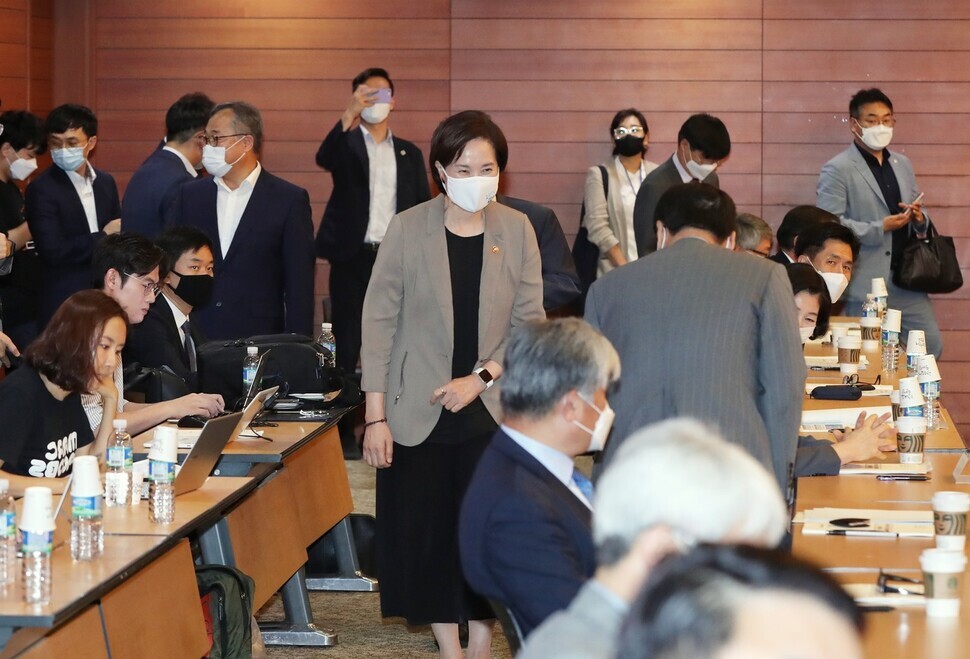hankyoreh
Links to other country sites 다른 나라 사이트 링크
Education Ministry to remove limits on remote education amid prolonged pandemic

The Ministry of Education (MOE) has announced plans to relax regulations and increase support to allow universities to expand online classes. Its aim is to use the remote education system adopted in response to the COVID-19 pandemic as a starting point toward future higher education reforms.
On July 2, the MOE announced such plans in a meeting with groups such as the Korean Council for University Education (KCUE) and Korean Council for University College Education (KCCE). According to the current standards for online classes at general universities, institutions are only allowed to offer online classes for up to 20% of all course credits, with attendance evaluated as a rule when grades are calculated. While the MOE decided to waive these standards for the spring semester of 2020 in response to the pandemic, its latest announcement means that it plans to substantially increase the number of online classes going forward. In concrete terms, the new plan includes removing limits on online classes and allowing all universities to decide their own credit restrictions and assessment methods, provided that no student completes 100% of their classes remotely. The plan seems to accept that more remote classes in the second semester will be unavoidable.
The MOE also plans to encourage universities to improve the quality of their online classes by revising its regulations to incorporate the establishment and operation of remote education support centers and online class management committees. As of next year, it will be allowing the operation of online master’s degree programs -- previously subject to a limit of 20% of all credits -- and online dual degree bachelor’s and master’s programs between universities. In the intermediate to long term, it plans to “fundamentally reconsider the four major conditions for university establishment and operation -- namely campuses, school buildings, basic assets for revenue generation, and faculty -- in light of remote classes and other changes in education methods,” it said. The idea is to allow for universities that conduct all classes remotely without a campus, along the lines of the Minerva Schools in the US.
At a time when issues such as loss of learning opportunities and tuitions remain unresolved after the adoption of remote classes for the first semester, some critics are calling the plans to establish this approach as the “new normal” inappropriate. In a statement, the Justice Party’s policy committee said, “We can’t just go ahead into the second semester without even resolving the issues with the first semester. Rather than remote classes per se, it should be the government’s responsibility in opening the door to remote classes that becomes the ‘new normal.’”
By Choi Won-hyung, staff reporter
Please direct comments or questions to [english@hani.co.kr]

Editorial・opinion
![[Editorial] Intensifying US-China rivalry means Seoul must address uncertainty with Beijing sooner than later [Editorial] Intensifying US-China rivalry means Seoul must address uncertainty with Beijing sooner than later](https://flexible.img.hani.co.kr/flexible/normal/500/300/imgdb/original/2024/0517/8117159322045222.jpg) [Editorial] Intensifying US-China rivalry means Seoul must address uncertainty with Beijing sooner than later
[Editorial] Intensifying US-China rivalry means Seoul must address uncertainty with Beijing sooner than later![[Column] When ‘fairness’ means hate and violence [Column] When ‘fairness’ means hate and violence](https://flexible.img.hani.co.kr/flexible/normal/500/300/imgdb/original/2024/0516/7417158465908824.jpg) [Column] When ‘fairness’ means hate and violence
[Column] When ‘fairness’ means hate and violence- [Editorial] Yoon must stop abusing authority to shield himself from investigation
- [Column] US troop withdrawal from Korea could be the Acheson Line all over
- [Column] How to win back readers who’ve turned to YouTube for news
- [Column] Welcome to the president’s pity party
- [Editorial] Korea must respond firmly to Japan’s attempt to usurp Line
- [Editorial] Transfers of prosecutors investigating Korea’s first lady send chilling message
- [Column] Will Seoul’s ties with Moscow really recover on their own?
- [Column] Samsung’s ‘lost decade’ and Lee Jae-yong’s mismatched chopsticks
Most viewed articles
- 1[Editorial] Transfers of prosecutors investigating Korea’s first lady send chilling message
- 2[Exclusive] Unearthed memo suggests Gwangju Uprising missing may have been cremated
- 3[Column] US troop withdrawal from Korea could be the Acheson Line all over
- 4[Editorial] Intensifying US-China rivalry means Seoul must address uncertainty with Beijing sooner t
- 5Xi, Putin ‘oppose acts of military intimidation’ against N. Korea by US in joint statement
- 6[Column] When ‘fairness’ means hate and violence
- 7‘Shot, stabbed, piled on a truck’: Mystery of missing dead at Gwangju Prison
- 8China calls US tariffs ‘madness,’ warns of full-on trade conflict
- 9Seoul government announces comprehensive measures to prevent lonely deaths
- 10Records show how America stood back and watched as Gwangju was martyred for Korean democracy